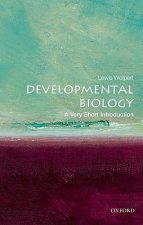
Kód: 02717273
Molecular Methods in Developmental Biology
Autor Matt Guille
The process whereby a single cell, the fertilized egg, develops into an adult has fascinated for centuries. Great progress in understanding that process, h- ever, has been made in the last two decades, when the techniques of molec ... celý popis
- Jazyk:
 Angličtina
Angličtina - Vazba: Brožovaná
- Počet stran: 217
Nakladatelství: Humana Press Inc., 2010
- Více informací o knize

Mohlo by se vám také líbit
Darujte tuto knihu ještě dnes
- Objednejte knihu a zvolte Zaslat jako dárek.
- Obratem obdržíte darovací poukaz na knihu, který můžete ihned předat obdarovanému.
- Knihu zašleme na adresu obdarovaného, o nic se nestaráte.
Více informací o knize Molecular Methods in Developmental Biology
Nákupem získáte 326 bodů
 Anotace knihy
Anotace knihy
The process whereby a single cell, the fertilized egg, develops into an adult has fascinated for centuries. Great progress in understanding that process, h- ever, has been made in the last two decades, when the techniques of molecular biology have become available to developmental biologists. By applying these techniques, the exact nature of many of the interactions responsible for forming the body pattern are now being revealed in detail. Such studies are a large, and it seems ever-expanding, part of most life-science groups. It is at newcomers to this field that this book is primarily aimed. A number of different plants and animals serve as common model org- isms for developmental studies. In Molecular Methods in Developmental Bi- ogy: Xenopus and Zebrafish, a range of the molecular methods applicable to two of these organisms are described, these are the South African clawed frog, Xenopus laevis, and the zebrafish, Brachydanio rerio. The embryos of both of these species develop rapidly and externally, making them particularly suited to investigations of early vertebrate development. However, both Xenopus and zebrafish have their own advantages and disadvantages. Xenopus have large, robust embryos that can be manipulated surgically with ease, but their pseudotetraploidy and long generation time make them unsuitable candidates for genetics. This disadvantage may soon be overcome by using the diploid Xenopus tropicalis, and early experiments are already underway. The transp- ent embryos of zebrafish render them well-suited for in situ hybridization and immunohistochemistry, and good for observing mutations in genetic screens.
 Parametry knihy
Parametry knihy
Zařazení knihy Knihy v angličtině Mathematics & science Biology, life sciences Developmental biology
3260 Kč
- Plný název: Molecular Methods in Developmental Biology
- Podnázev: Xenopus and Zebrafish
- Autor: Matt Guille
- Jazyk:
 Angličtina
Angličtina - Vazba: Brožovaná
- Počet stran: 217
- EAN: 9781617371899
- ISBN: 1617371890
- ID: 02717273
- Nakladatelství: Humana Press Inc.
- Hmotnost: 401 g
- Rozměry: 229 × 152 × 15 mm
- Datum vydání: 28. October 2010
Oblíbené z jiného soudku
-

Developmental Biology
6913 Kč -

Principles of Development
1915 Kč -

Developmental Biology
1703 Kč -

World Beyond Physics
738 Kč -

Development of Animal Form
1202 Kč -

Understanding Reproduction
527 Kč -

Stem Cell Production
5355 Kč -

Stem Cells in Veterinary Science
5945 Kč -

Protocols for Micropropagation of Selected Economically-Important Horticultural Plants
6536 Kč -

The Biology of Ageing: From Hallmarks to Drugs
4158 Kč -

Manipulating the Mouse Embryo: A Laboratory Manual, Fourth Edition
5307 Kč -

Developmental Biology: A Very Short Introduction
282 Kč -

Stem Cells
5453 Kč -

Zebrafish: Cellular and Developmental Biology, Part A Cellular Biology
5497 Kč -

Evo-Devo: Non-model Species in Cell and Developmental Biology
5945 Kč -

DNA Damage and Chromosomal Instability
5576 Kč -

Cilia: From Mechanisms to Disease Part A
5624 Kč -

Cellular Senescence and Aging
5400 Kč -

Instrumental Insemination of Honey Bee Queens
743 Kč -

Introduction to Animal Behavior: An Integrative Approach
714 Kč -

Circulating Tumor Cells, From Biotech Innovation to Clinical Utility
6589 Kč -

Biogerontology - Mechanisms and Interventions
4545 Kč -

Atlas of Plant Cell Structure
6869 Kč -

Mechanisms of Morphogenesis
4222 Kč -

Celiac Disease
4841 Kč -

HOX Genes
4679 Kč -

Developmental Biology
5502 Kč -

Photographic and Descriptive Musculoskeletal Atlas of Gorilla
2994 Kč -

Germ Cells
4189 Kč -

Pattern Formation in Plant Tissues
1740 Kč -

Mitosis and Meiosis Part B
5624 Kč -

Handbook of Stem Cell Applications
26825 Kč -

Handbook of Stem Cell Therapy, 2 Teile
23847 Kč -

Organoids and Mini-Organs
3040 Kč -

Aging of the Organs and Systems
5060 Kč -

Volume Electron Microscopy
5400 Kč -

International Review of Cytology
8478 Kč -

Animal Species for Developmental Studies
3389 Kč -

Extracellular Matrix in Development and Disease
6167 Kč -

Transdifferentiation
2755 Kč -

Neural Stem Cells in Development, Adulthood and Disease
3289 Kč -

Legend of the Underwater Panther
607 Kč -

Cell Cycle Control
6100 Kč -

Reproductive Biology and Early Life History of Fishes in the Ohio River Drainage
7668 Kč -

Handbook of Embryogenesis
3010 Kč -

Pluripotent Stem Cells
3755 Kč -

Cell-Cell Channels
5060 Kč -

Meiosis
3289 Kč -

The Neocortex
5060 Kč
Osobní odběr Praha, Brno a 12903 dalších
Copyright ©2008-24 nejlevnejsi-knihy.cz Všechna práva vyhrazenaSoukromíCookies







 Vrácení do měsíce
Vrácení do měsíce 571 999 099 (8-15.30h)
571 999 099 (8-15.30h)